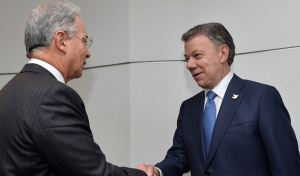nsnbc : Colombian President Juan Manuel Santos who is serving his last year in office, suggested a reconciliation between him and ex-president Alvaro Uribe. Referring to the peace process in Colombia and the country’s volatility, Santos stressed that a moment of change, to live together peacefully, has come.
 Speaking with the Spanish news agency EFE Colombia’s President and Nobel peace laureate Juan Manuel Santos suggested that he wants to reconcile with ex-president Alvaro Uribe. Santos was one of Alvaro Uribe’s most promising protegés and allies before their alliance turned sour. Commenting on the fact that he is in his last year in office and the peace process for which he received a Nobel peace prize, Santos said:
Speaking with the Spanish news agency EFE Colombia’s President and Nobel peace laureate Juan Manuel Santos suggested that he wants to reconcile with ex-president Alvaro Uribe. Santos was one of Alvaro Uribe’s most promising protegés and allies before their alliance turned sour. Commenting on the fact that he is in his last year in office and the peace process for which he received a Nobel peace prize, Santos said:
“I would like to leave the country much less polarized than it is. For me it would be an immense pleasure. I think what would be most convenient for the country would be to be able to reconcile with my predecessor, former President Uribe.”
Santos and Uribe have long been seen as more liberal or more conservative representatives or Colombia’s right-wing and neoliberal establishment in politics, the military, and Colombia’s powerful oligarchical structures – it’s “permanent government” as some would have it.
In 2002, ahead of presidential elections, Santos became one of Alvaro Uribe’s most prominent protegés and one of Uribe’s most prominent supporters. Both left the Liberal Party to form the new political movement that helped Uribe to win the 2002 elections.
In 2010 Santos and Uribe broke when Santos appointed several of Uribe critics as cabinet members. Most importantly, Santos appointed a Prosecutor General who would dare to go after Uribe in a time when criminal cases against the former president began piling up and Santos – at that time covertly – launched peace talks with the Revolutionary Armed Forces of Colombia – People’s Army (FARC-EP).
By 2010 – 2011 a large part of Colombia’s “establishment” as well as FARC-EP leaders had realized that a continuation of the decades-long civil war would have devastating consequences for the political and economic elite as well as for the guerrilla. It was – although this is rarely admitted – this recognition that more than anything else brought the Santos administration and the FARC-EP to the negotiating table.
Unofficial peace talks were launched in 2011 after explorative talks in 2010. The rift and bitter rivalry between Santos and Uribe (and the respective factions they represented) widened when Santos officially announced that his administration had started peace talks with the FARC-EP.
In 2016 a peace agreement ended 52 years of civil war between the Colombian state and the FARC-EP. Moreover, the Santos administration and the leftist National Liberation Army (ELN) recently agreed to hold contiguous talks with the aim to reach an agreement on a bilateral ceasefire by early September 2017.
Uribe, accused of multiple serious crimes within the framework of the transitional justice system that was established on the basis of the peace accord between the State and the FARC-EP has been, and continues to be a stern opponent of talks with any leftist guerrilla, ex guerrilla, the political party the FARC is set to form, and most importantly, the transitional justice system.
However, Santos told reporters that the country needs this reconciliation. He asked, rhetorically:
If we can reconcile with the FARC how are we not be able to reconcile among the Colombians that unfortunately for 200 years of republican life have had more wars than any other country in Latin America?
Reaching out to Uribe – and some say trying to unite the right wing and liberal forces in Colombia ahead of the coming elections, Santos said “the moment of change and to live together and in peace” has come.
CH/L & A/N – nsnbc 10.08.2017
Source Article from https://nsnbc.me/2017/08/10/colombias-santos-suggests-reconciliation-with-uribe/
Related posts:
Views: 0
 RSS Feed
RSS Feed

















 August 10th, 2017
August 10th, 2017  Awake Goy
Awake Goy 











 Posted in
Posted in  Tags:
Tags: 
















